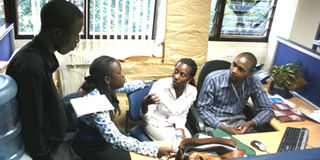University students champion green efforts

A group of Kenyan university students at a brainstorming session during the MESA conference. Photo/COURTESY
The battle to protect the earth’s precious natural resources in the face of climate change, rapid deforestation, air and water pollution has been taken to our local universities.
As last month came to a close, about 210 academicians, policy makers, students other stake holders in education, development and the environment from across the world gathered at the United Nations Complex in Gigiri to discuss how African universities can best contribute to efforts to conserve our environment .
The conference facilitated by the United Nations Environmental Programme sought to find ways in which environment and education for sustainable development concerns can be incorporated into the teaching, research, community engagement and management of universities in Africa. Education for sustainable development is a concept that embraces the use of innovations that will improve the quality of life without compromising the lives of future generations.
UNEP and its partners who include the Association of African Universities have been supporting an initiative dubbed ‘Mainstreaming Environment and Sustainability in African Universities’ (MESA).
The week-long Gigiri gathering was the first international MESA conference, which also sought to know whether universities are responding to challenges brought about by adverse technological and human effects on the environment and climate change .
Why the focus on Africa and its universities in particular? “Climate change will have substantive effects on our environment, affecting food availability and health,” says Akpezi Ogbuigwe, the head of UNEP’s Environmental, Education and Training Unit.
“ We need to speed up our response to environmental challenges and one of the major ways of doing so is by increasing the capacity of our universities to develop and use environmental knowledge for sustainable development,” she says. “Without knowledge, you can’t advance. Universities are one of the places where you can get knowledge that will direct positive change. Students will carry and implement critical knowledge on how to conserve our precious resources as they go to work in different sectors of the economy.”
“The MESA Universities Partnership aims to boost the quality and policy relevance of university education in Africa by making environment and sustainability a key topic across curricula, research and community engagement activities in universities,” says Achim Steiner, the executive director of UNEP.
Ms Akpezi says that university students have emerged as one of the strong voices in advocating for safe environmental practices and sustainable development in Africa. Indeed, during the conference, the 32 student delegates, were vocal as they mooted ideas on how they would go about implementing projects to create environmental awareness in their institutions and local communities.
They repeated US President-elect Barack Obama’s campaign slogan ‘Yes we can’ every time they presented an idea. This underlined their determination to ensure that Africa’s rich mosaic of forests and woodlands, freshwater bodies, mountains and deserts are also enjoyed by future generations.
The Kenyan students drawn from the University of Nairobi, Kenyatta and Strathmore universities plan to set up a MESA students’ movement that will lead responses to changes driven by technology, globalization and adverse human actions to the environment.
“The students who attended this conference have resolved to initiate the set up of a highly interactive MESA student website that will give relevant information on environmental conservation and sustainable development,” said Grace Mwaura, an Environmental Science student from Kenyatta University.
The students also plan to have audio-visual documentation of student projects initiated by MESA universities. Also in the pipeline is a plan to use recycled paper to produce a quarterly student’s magazine, translated in three key languages.
“We are also thinking of field visits and community projects and internship and volounteer programmes hosted by MESA partner organizations that will enable us to transform knowledge into action. We have also proposed inter university and interfaculty exchange programmes that will give us an opportunity to share best practices with other students,” says David Osiany, a second year student of Literature and Communication from the University of Nairobi.
They have also proposed to have annual awards to celebrate exemplary student action in sustainability and environmental conservation efforts. “Of course we will also mentor the younger generation who are still in primary and secondary schools,” adds David.
Their big project for now is a community sustainability centre, which they plan to establish in Gwasi, Nyanza province. “The centre will be initially used to teach the local community how to conserve the environment through the use of solar energy in income generation activities.”
Ms Akpezi stresses that environmental education should not be confined to faculties of environment but should be incorporated in other disciplines, whether art or science based.
The MESA initiative is already reaping solid gains, with several African universities mainstreaming environmental content into non-environmental courses.
For instance, the University of Nairobi has integrated environmental education for sustainable development into the ‘Contemporary Legal Problems’ course. Students taking this course are required to understand the practical application of laws in sustainable development.
According to the MESA 2004-2008 report, the department of Agricultural Economics in the University of Nairobi has re-oriented the curriculum to include aspects of climate change and adaptation, natural resource economics and management as well as international protocols on the environment.
At the Egerton University, a Masters Degree in Environmental Science based on UNEP MESA material has been developed and an annual environmental week established to enhance awareness of sound environmental practices among local communities.
The world continues to grapple with land degradation, water scarcity, deforestation, climate change and a myriad of other environmental challenges that promise to worsen disease and poverty levels. The onus is on university students to step up to the plate and help protect our well-being.




